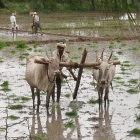Climate change will hit Indian cereals, benefit legumes
28 November 2011 | EN

India could produce fewer cereals but more legumes due to climate change.
David Dickson
[NEW DELHI] Indian farmers could be producing less rice and wheat and more legumes as a result of global warming, a senior crop scientist has said.
Climate change would have a negative impact on cereal crops such as wheat and rice, Bandi Venkateswarulu, director of Central Research Institute for Dryland Agriculture, Hyderabad, told a South Asia media workshop on climate change in Delhi this month (17 November).
On the other hand, Venkateswarulu told the workshop organised by the Delhi-based non-government organisation, Centre for Science and Environment, legumes such as soybean and groundnut will benefit from the change in temperature.
The productivity of most cereals in India would decrease due to rise in temperature and decline in water availability. "A projected loss of 10–40 per cent will occur in crop production by 2100," he said.
A rise of one degree Celsius could reduce yields of major food crops by three to seven per cent in India, with higher losses during the winter (rabi) crop season, he added.
The growing period for crops in rain-fed areas, which account for two-thirds of India's cropland, could reduce.
Rainfall variations would impact summer (kharif) crops; while changes in minimum temperatures would influence the winter crops. Both temperature and rainfall changes would affect rice production in the Indo-Gangetic plain.
Wheat production in irrigated lands is projected to decline by six per cent by 2030. “The higher temperature will also make the wheat crop susceptible to wheat rust because wheat is found to be more susceptible to rusts at higher temperatures,” he observed.
Soyabean yields are projected to rise by 8–13 per cent and groundnut by up to seven per cent by 2030, he said.
"Apart from this, it has been found that there has been a shift of the apple belt to higher elevations in Himachal Pradesh state because of inadequate chilling in the plains — crucial for good apple yields," Venkateswarulu said. ]
Read the detailed article at :- http://www.cdrn.org.in/show.detail.asp?id=22926
No comments:
Post a Comment